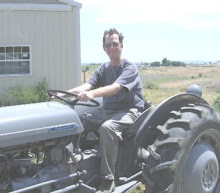Before work starts, we'll build a workbench like that shown in this picture.

Since the Rapide is considerably larger and heavier than a Triumph Tiger Cub, I think the wheels we put under the stand will be a bit more substantial. Otherwise, unlike the Cub where you put an engine in a frame, the Vincent is for all intents and purposes "frameless" - we'll start with assembling the engine, adding the oil tank, and then the front and rear suspension members. Instead of holding it in place with tie-downs like this picture, The Vincent has a rear prop-stand and a front prop-stand (which is really both front side-stands opened and rotated downward; very clever! Such is how I did it in the early 80s when I restored the bike the first time.
After a day to think about it, what size to make this thing? well, given a wheelbase of 56", I'd say 7' long by 30" wide will give plenty of good working real-estate! Maybe 18" high... My last stand didn't have wheels, the tie-downs make more sense now.










